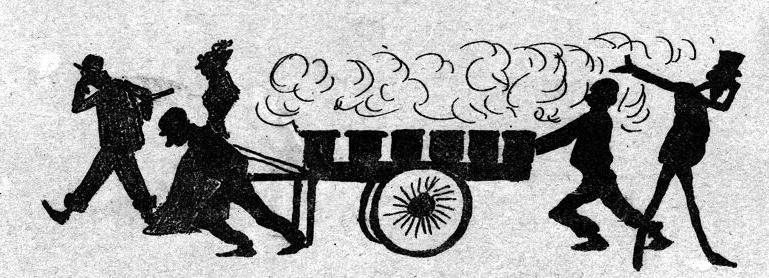The Kelly the Coed 1 (1999)Night Men with Their Rude Carts, and Other News
On the Shelf

An undated illustration depicting night-soil men
- Ta-Nehisi Coates has offered a glimpse of what we can expect from his new series of Black Panther comics, and it involves, as all good stories do, a superhuman terrorist group called the People. “In my work for The AtlanticI have, for some time, been asking a particular question: Can a society part with, and triumph over, the very plunder that made it possible? In Black Pantherthere is a simpler question: Can a good man be a king, and would an advanced society tolerate a monarch? … The Black Panther I offer pulls from the archives of Marvel and the character’s own long history. But it also pulls from the very real history of society—from the precolonial era of Africa, the peasant rebellions that wracked Europe toward the end of the Middle Ages, the American Civil War, the Arab Spring, and the rise of ISIS… Chris Claremont’s The Uncanny X-Menwasn’t just about an ultracool band of rebels. That series sought to grapple with the role of minorities in society—both the inner power and the outward persecution that come with that status. And so it is, I hope, with Black Panther. The questions are what motivate the action. The questions, ultimately, are more necessary than the answers.”
- Take some time away from your busy day and think about the logistics of nineteenth-century feces disposal, won’t you? Adee Braun can help: “Night soilwas the name euphemistically given to human waste because it was removed from privies under the cloak of darkness so that polite society would be spared from confronting its own feces as the men carted the crap away, leaving a trail of stench in their wake … Night soil collection was big business. Hundreds of men were employed in cities—mostly African-Americans and immigrants who were either independent entrepreneurs or employees of city contractors. The night men, with their ‘rude carts,’ were considered a nuisance at best. Their night work also left them vulnerable to hoodlums who sometimes stoned the men and occasionally shot their horses. At least the pay was decent, even if the work was not. The night soil men used rudimentary long-handled dippers or buckets to scoop the mephitic waste into barrels or tanks on a wagon.”
- Tim Parks continues his dissection of the politics and vagaries of professional translation, that most unsung of literary pursuits: “Does translation matter? Does the choice of translator matter? Some translators’ associations (in Germany for example) insist that a translator ought to be paid a royalty for the translation and share in the commercial success of the work, as if the individual translator had the same impact on the work as the author. This is nonsense. Umberto Eco was better translated by Geoffrey Brock and Richard Dixon than by William Weaver, but The Name of the Rose,which Weaver translated, was an infinitely better book than The Mysterious Flame of Queen Loana(Brock) or Numero Zero(Dixon). Why should the one translator grow rich and the others not? … To introduce royalties would be to encourage the finest translators to drop literary work altogether and concentrate on genre novels.”
- Speaking of unsung careers in the arts, I don’t spend enough time thinking about the production designers of the world, and so was grateful to learn about Ken Adam, whose set designs for Dr. Strangelove, Barry Lyndon, and Goldfinger, among others, changed the game. Adam died last week, at ninety-five: “Adam’s magnificent designs, vast and lucid and expressive but often with an undercurrent of chilling horror, transformed those films in which they were featured … He decided, he said, to ‘forget the old way of making sets—wood and paper and so on—and try to do it all for real. I had the chance to let myself go because there was nobody looking over my shoulder.’ ”
- While we’re reminiscing: Sunny Balzano, the proprietor of a bar called Sunny’s in Red Hook, Brooklyn, died last week. Tim Sultan, whose memoir Sunny’s Nightsjust came out, remembers his friend: “Instinctually, he was familiar with men’s inner lives, giving direction and guidance even to those he had only just met. Many came to him for this, and in his very genuine attentiveness and his gentle conversational manner he unfailingly gave it. The final destination was always this: arriving at a place where one valued oneself. Sunny had a great appreciation for each person’s significance and he reflected that worth back on us. One always seemed to feel better after a visit with Sunny.”





